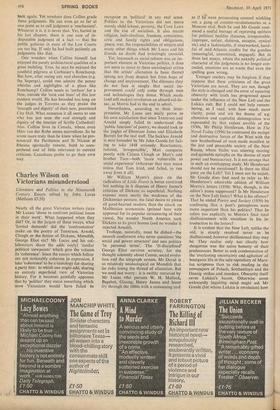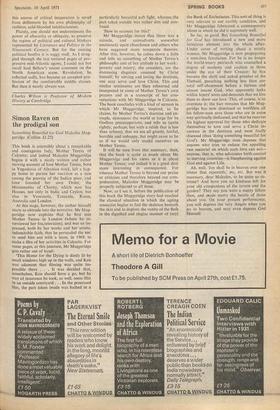Charles Wilson on Victorians misunderstood
Literature and Politics in the Nineteenth Century Essays edited by John Lucas (Methuen £3.50) Nearly all the great Victorian writers (says Mr Lucas) `chose to confront political issues in their work'. What happened when they did? Or, in the jargon of these essays, what `formal demands' did the 'confrontation' make on the poetry of Tennyson, Arnold, Cough or the fiction of Dickens, Meredith, George Eliot etc? Mr Lucas and his col- laborators share (he adds coyly) 'similar political viewpoints' which give the volume its 'coherence'. Since the essays which follow are not noticeably coherent in expression, I take 'coherence' to be a tautology for sharing a party line: to which one might add, sharing an entirely superficial view of Victorian history. For it becomes painfully apparent that by 'politics' they mean something which most Victorians would have failed to recognise as `political' in any real sense. Politics to the Victorians did not mean merely child labour, poverty, the Corn Laws and the rise of socialism. It also meant religion, individualism, freedom, conscience, civic and family rights and obligations, peace, war, the responsibilities of empire and many other things which Mr Lucas and his friends no doubt find irritatingly unsocial.
Yet, inasmuch as social reform was an im- portant element in Victorian politics, it does not seem to occur to these sociological critics that the artists' alienation (a basic theme) sprang not from despair but from hope of change and improvement. The dilemma they do not face is simply that social im- provement could only come through men and technologies they detest. Which made (and still makes) revolution an absurd cul-de- sac, as Morris had in the end to admit.
Nevertheless, according to their inter, pretation, Mr Lucas can easily prove to his own satisfaction that since Tennyson and Arnold simply failed to understand the `public function' of poetry, we should look to the jingles of Ebenezer Jones and Elizabeth Barrett for the real stuff. The luckless Arnold is next hounded by Mr John Goode for fail, ing to take 1848 seriously. Reactionary, isolated, 'irresponsible', Matt compares poorly with Citizen Clough or Matt's odd brother Tom—both 'more vulnerable to social experience' (whatever that may mean unless that Tom tried, and failed, to run away from it all).
Mr William Myers's piece on the radicalism of Little Dorrit is better contrived but nothing in it disposes of Henry James's criticism of Dickens as superficial. Nothing exposes more neatly the weakness of the Dickensian posture, the fatal desire to please all good-hearted readers, than the attack on Malthusian economists (printed here with approval for its popular caricaturing of their views). No wonder North America took Dickens to its great bosom (and no wonder it rejected Arnold).
Trollope, naturally, must be dished—the smooth conformist who never questions 'the social and power structure' and sees politics 'in personal terms'. The 'ill-disciplined' George Eliot survives scrutiny, for she thought solemnly about Comte, social evolu- tion and the telegraph system. Mr David is so relatively unideological on Meredith that he risks losing the thread of alienation. But we need not worry : it is swiftly retrieved by Mr Lucas who pursues W. H. Mallock, Bagehot, Gissing, Henry James and lesser fry through the 1880s with a consuming zeal as if he were prosecuting counsel winkling out a gang of counter-revolutionaries at a Moscow trial. Both he and Mr Goode com- mand a useful barrage of reproving epithets for political baddies (fatuous, irresponsible, improper, unfair, dubious, escapist, cynical etc) and a fashionable, if overworked, hand- ful of mid-Atlantic credits for the goodies (meaningful, committed, engaged). But in these last essays, where the nakedly political character of the judgments is no longer con- cealed, emotions are so warm that even the spelling goes wrong.
Younger readers may be forgiven if they suppose that these criticisms of the great Victorians are novel. They are not, though the style is changed and the error of equating obscurity with truth has progressed apace under the influence of the New Left and the Lukdes cult. But I could not help remem- bering, as I read, with how much more clarity, point and wit the theme of e.g. alienation and capitalist disintegration was expounded by that enfant terrible of the 1930s, Mr Philip Henderson. How in The Novel Today (1936) he contrasted the malign and destructive forces of the West with the new brotherhood of man made manifest in the just and peaceable society of the New Russia, where Stalin was uttering moving and quotable epitaphs on the demise of state power and bureaucracy. Is it not strange that in such an overlapping study, Mr Henderson should not be mentioned? Is there no filial piety on the Left? Yet I must not be unjust. Mr Goode does find need to refer to- Mr Henderson's admirable edition of William Morris's letters (1950). Why, though, is the editor's name suppressed? Is Mr Henderson on the New Left Index? What is his offence? That he ended Poetry and Society (1939) by confessing that a poet's perceptions were more important than his politics? That he refers too explicitly to Morris's final total disillusionment with socialism in his in troduction to the letters?
It is evident that the New Left, unlike the old, is stoutly resolved never to be disillusioned, however disillusioned they may be. They realise only too clearly how dangerous was the naive honesty of their predecessors. Better to seek condemnation of the 'everlasting uncertainty and agitation' of bourgeois life in the safe repository of Marx- ian scriptures than to risk reading in the newspapers of Polach, Solzhenitsyn and the Danzig strikes and murders. Obscurity itself saves Lukics's bacon. Otherwise some awkwardly inquiring mind might ask Mr Goode (for whom Lukacs is revelation) how this source of critical inoperation is saved from defilement by his own philosophy of ruthless, cold-blooded totalitarianism.
Plainly, one should not underestimate the power of obscurity or obliquity, to preserve the regime of politiCal and cultural blinkers represented by Literature and Politics in the Nineteenth Century. But for the coming political bonfire it is soggy stuff. As I strug- gled through the last tortured pages of pro- gressive mid-Atlantic agony, I could not but recall Saul Bellow's recent comment on the North American scene. Revolution, he reflected sadly, has become an accepted pro- fession of the comfortable middle classes. But then it nearly always was.
Charles Wilson is Professor of Modern History at Cambridge











































 Previous page
Previous page